
It’s been a while since many of us last traveled to Japan, and plenty of visitors are eager to splurge. But with limited budgets and luggage space, smart shopping is key.
We asked veteran tour guide Mr. K to share his post-pandemic insights on what’s truly worth buying in Japan. From analyzing why certain goods are best picked up locally to highlighting six must-buy categories of tax-free items, this guide will help you spend wisely—even when indulging in revenge shopping. If you’re unsure what to bring home from Japan, use this practical checklist as your go-to shopping playbook!
Main image: PIXTA (model is not the interviewee)
- Table of Contents
Profile: Tour Guide Mr. K
Our interviewee, Taiwanese tour guide Mr. K, has over five years of experience leading groups. Outgoing and multilingual, he has guided tours across Europe, Japan, Korea, and East Asia. With so many Taiwanese travelers visiting Japan, his experience leading Japan tours is especially extensive. Laughing, he admits: “I might know Japan’s top tourist spots better than the area where I actually live!”
Features of Recommended Tax-Free Must-Buys
1. Buying Japanese Brands in Japan Means Extra Peace of Mind
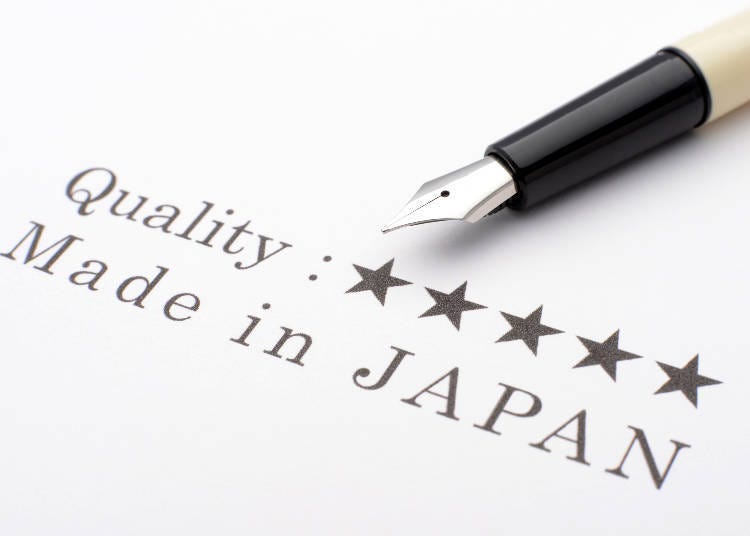
Japanese products have an excellent reputation worldwide, and for many international visitors, Japanese brands are synonymous with reliability. Popular names include home electronics like Panasonic, Sharp, and Zojirushi, as well as beauty brands such as Shiseido, KOSÉ, and DHC. Many of these items are made in Japan, while even overseas-manufactured goods sold domestically must meet Japan’s strict quality standards. Purchasing directly in Japan not only ensures authenticity but also eliminates the risks of counterfeit goods often associated with resellers or unauthorized buyers.
2. Lower Prices When You Buy in Japan

Beyond guaranteed quality, Mr. K points out that lower prices are another big draw when shopping in Japan. Purchases over 5,000 yen are eligible for tax-free benefits, and frequent seasonal sales mean extra savings on everything from fashion and household goods to electronics. Such discounts are rarely passed on through resellers or overseas online stores. With the yen’s current weak exchange rate, spending in Japan can be surprisingly cost-effective—smart shoppers may even save tens of thousands of yen. It’s the perfect chance to make the most of your trip with some serious shopping.
3. Products Sold in Japan Aren’t Altered by Overseas Regulations

While many Japanese goods are available abroad through official agents, the difference is especially noticeable with medicines. In recent years, popular stores like Matsumoto Kiyoshi and Don Quijote have opened in places such as Taiwan and elsewhere, making it easier to buy Japanese drugstore items without leaving home. However, due to differences in pharmaceutical regulations, some products—like the painkiller EVE—are not sold overseas, meaning you need to purchase them in Japan.
Other medicines may be available abroad but with adjusted formulas. For example, Taisho’s cold medicine Pabron contains slightly different ingredients in Taiwan compared to Japan. Though the effect is generally similar, Mr. K admits he’s heard tour members say they find the Japanese version works better. For those who notice a difference, buying directly in Japan remains the preferred choice.
4. Consult Staff and Try Before You Buy
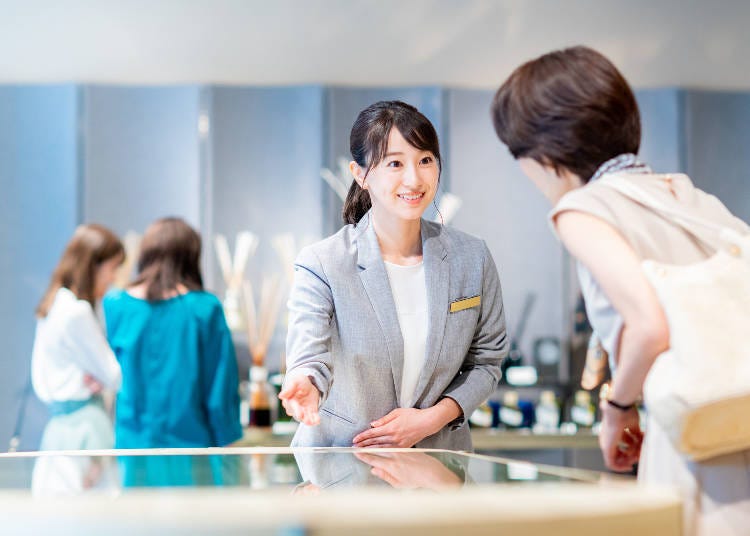
Mr. K notes, “At duty-free shops, tour members often ask me, ‘Can I buy this for a friend? Is this the right one?’ I always recommend trying it yourself or asking the staff—it’s far more reliable. After all, guides can’t read minds (laughs).”
In Japan, most staffed stores—whether drugstores, electronics retailers, or fashion boutiques—offer hands-on service. Electronics like hair dryers usually have demo units you can test for heat and airflow, while cosmetics and skincare come with testers so you can check compatibility with your skin.
At popular tourist areas, many stores also have staff who can communicate in foreign languages, and even those who can’t will often use translation tools. Whether you need product advice or usage tips, you’ll find friendly support. Since you’re already there in person, take advantage of Japan’s renowned hospitality and don’t hesitate to ask!
5. Shop the Latest Trends and Japan-Exclusive Items

Japanese retailers are incredibly quick to respond to trends. Mr. K says that even when visiting multiple times within a short period, he often notices different products featured in the best-seller displays—making it easy to see what’s currently hot or whether new items have hit the shelves. A quick walk through the store is all it takes to catch up on the latest must-haves.
Japan is also known for its abundance of exclusive items, from regional and store-only releases to limited-edition products. Many global brands, recognizing Japan’s love for exclusivity, often launch Japan-only designs—whether it’s bags from Kate Spade, Coach, BVLGARI, and GUCCI, or sneakers from CONVERSE, adidas, and NIKE. These items often come at a higher price abroad, so buying them directly in Japan is not only more affordable but also ensures authenticity.
Top 6 Tax-Free Must-Buys in Japan for Travelers
1. Medicine & Health Supplements
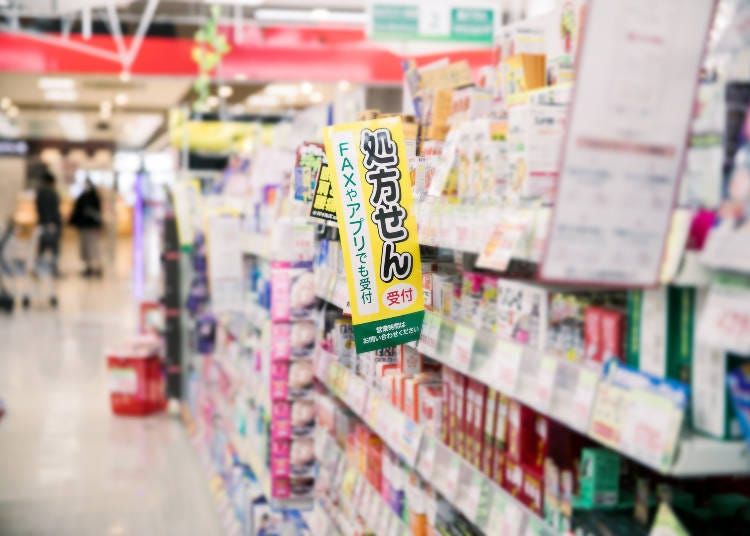
Mr. K recommends prioritizing medicine as the first thing to buy. Popular picks include painkillers like EVE, Taisho’s Pabron cold medicine, WAKAMOTO digestive tablets, and Ohta’s Isan, as well as liquid bandages, MUHI insect bite relief, and various pain relief patches.
Concerns over reseller reliability, expiration dates, or ingredient differences in overseas versions make in-person purchases more reassuring. A single trip through a tax-free drugstore in Japan will show you just how many tourists are filling their baskets to the brim with these essentials.
2. Cosmetics & Skincare
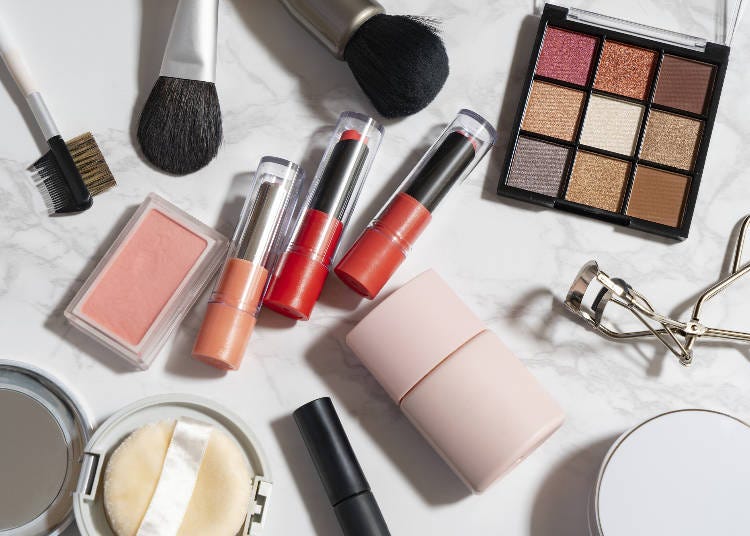
Alongside medicine, Japanese cosmetics and skincare products are hugely popular, with countless well-known brands like Shiseido’s MAQuillAGE and the beloved drugstore line excel. Mr. K notes that due to the weaker yen during the pandemic, many Taiwanese travelers exchanged yen in advance, making in-person shopping even more budget-friendly.
He recommends seizing this chance to try premium brands that may have felt out of reach before—like POLA, SOCIE, Clé de Peau Beauté, and ELIXIR. With exchange rate differences, you might enjoy savings of 5–15% compared to past years. Plus, while some of these brands are available in Taiwan via department stores or online, discounts are rare. For budget-conscious travelers, it’s the perfect time to explore luxury skincare and makeup at a better price.
3. Electronics
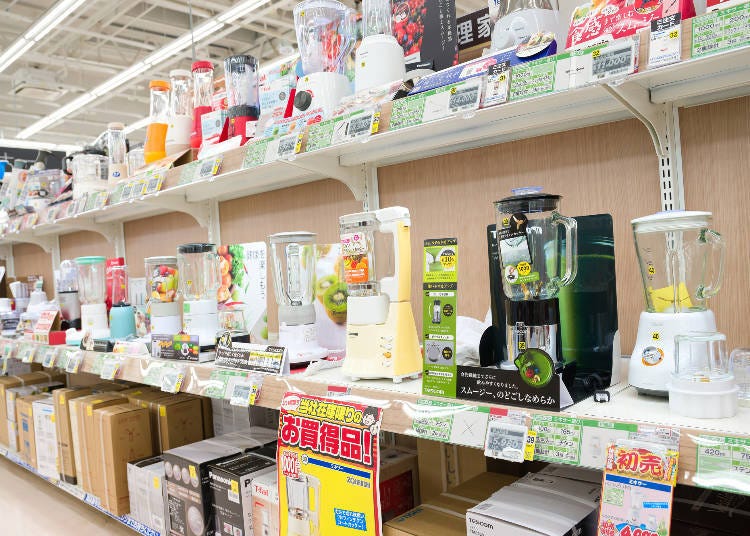
When it comes to innovative home appliances, Japan is in a league of its own. From adding advanced features to everyday gadgets—like Panasonic’s nanoe hair dryers and Tescom’s collagen-infused models—to creating entirely new lifestyle tech, Japan seamlessly blends convenience with creativity. Must-try items include Panasonic’s eye massagers, Omron’s low-frequency therapy devices, and a range of facial cleansing tools and beauty gadgets. It’s no wonder stores like BicCamera and Yodobashi are always packed with tourists.
Mr. K notes that Japanese electronics have long been a favorite among Taiwanese shoppers, and the current weak yen makes them an even better deal. Now is the time to snap up popular kitchen appliances like SHARP’s waterless cooking pots and steam ovens, Zojirushi rice cookers, as well as home essentials like Dyson vacuum cleaners, Panasonic bidet seats, and even ceiling lights.
Exclusive BicCamera Discount Coupon!
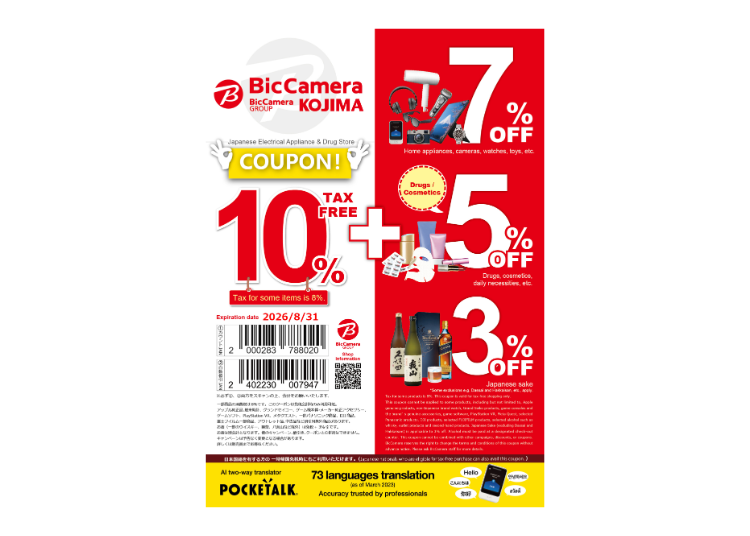
Use this coupon to enjoy not only tax-free shopping, but also extra savings: 7% OFF on cameras, watches, home appliances, toys, and contact lenses; 5% OFF on medicines, cosmetics, food, and daily goods; and 3% OFF on Japanese sake (excluding Dassai and Hakkaisan). Just show the coupon at checkout when shopping at BicCamera in Japan to receive your discount!
Joshin Tax-Free & Special Discount Coupons(Tax-Free + Extra 8% OFF)

4. Japanese Alcohol
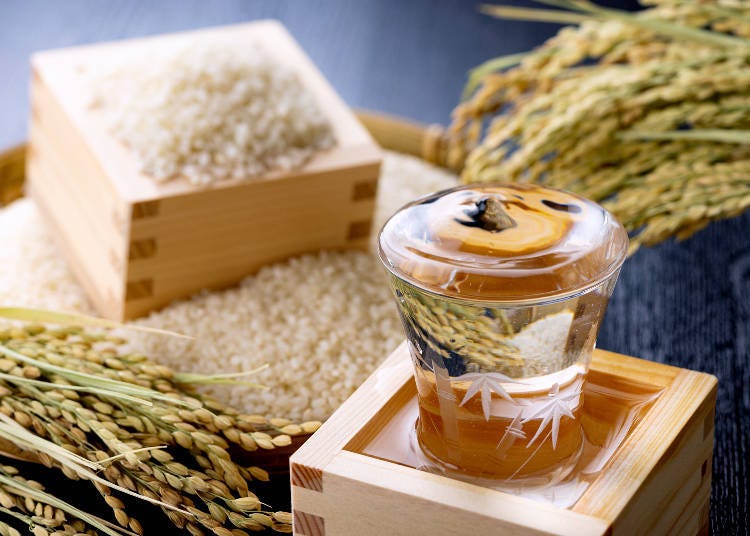
When people talk about what they regret not buying more of in Japan, alcohol is always high on the list! Mr. K shares that before the pandemic, he would regularly buy sake at airports and duty-free shops. From renowned labels like Dassai sake and CHOYA umeshu, to premium junmai daiginjo and regional favorites like Hokkaido plum wine and Yoichi whisky, each offers distinct flavors and aromas with loyal fans. Whether for sipping or pairing with meals, Japanese alcohol is a worthy purchase.
Although many Japanese restaurants outside Japan serve imported sake and spirits, prices are often steep. For true enthusiasts, buying directly in Japan is far more cost-effective. Plus, with elegant packaging, Japanese alcohol makes for an excellent gift or classy souvenir—perfect for both personal enjoyment and social gifting.
5. Luxury Watches
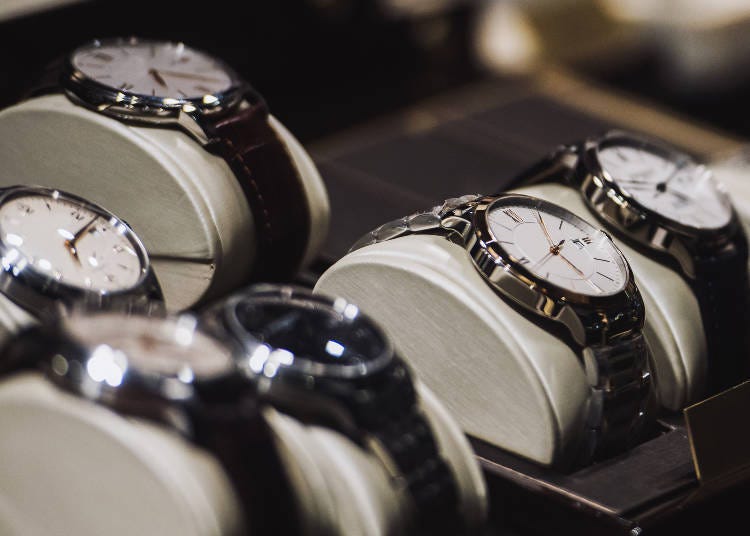
Many affluent travelers choose to buy luxury watches in Japan for one simple reason: they’re often significantly cheaper than in their home countries. High-end European brands like ROLEX, MONTBLANC, and OMEGA are especially popular. Mr. K recalls that during premium tour packages, it wasn’t uncommon for guests to spend hundreds of thousands of yen on a single watch—particularly during trips to Japan, where the savings make the splurge feel worthwhile.
Beyond European names, Japan is home to world-renowned watchmakers like SEIKO, CITIZEN, ORIENT, and MINASE. Japanese luxury watch retailers are plentiful and offer top-tier service. Even if you don’t speak Japanese, staff will go out of their way to assist using English or translation devices, patiently answering any questions. From the quality of the timepieces to the hospitality, shopping for watches in Japan is a premium experience from start to finish.
6. Designer Brands & Luxury Goods
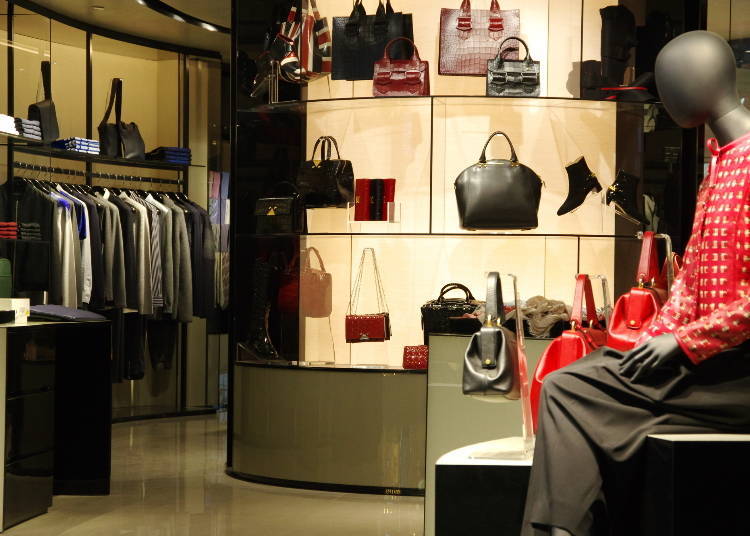
Luxury items are a top pick for many international visitors—especially when the yen is weak. Popular brands like Hermès, Dior, BVLGARI, CELINE, PRADA, Loewe, and Louis Vuitton often offer better prices in Japan. With countless outlets and massive shopping malls across the country, you can enjoy both tax-free perks and seasonal discounts.
Mr. K explains, “During sales season at outlets, you can get stunning deals. When you combine those with tax exemptions and store promotions, the final price in Japan can be less than half of what you’d pay in many other countries. It’s easy to see why people tend to splurge when shopping in Japan (laughs).”
Many luxury brands also release Japan-exclusive items, and homegrown labels like ISSEY MIYAKE’s BAOBAO remain fan favorites. If there’s a designer item you’ve been hesitating to buy, your trip to Japan might be the perfect chance to bring it home.
Recommended Tax-Free Shopping Spots
Tokyo
Osaka & Kyoto
Sapporo
BicCamera Discount Coupon
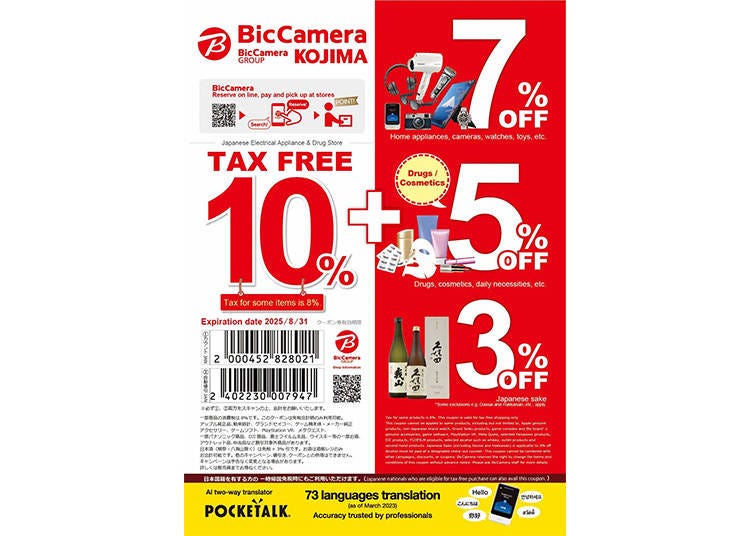
Show this coupon at checkout to enjoy tax-free shopping plus extra savings at BicCamera stores in Japan:
・7% OFF cameras, watches, electronics, toys, and contact lenses
・5% OFF medicines, cosmetics, food, and daily goods
・3% OFF Japanese sake (excluding Dassai and Hakkaisan)
Don’t forget to present it when making your purchase!
Mr. K’s Pro Tip! Bring a Shopping Bag Before You Splurge in Japan
Mr. K has one last reminder before you start your shopping spree: since July 2020, Japan has enforced a plastic bag charge. Unlike in the past, plastic bags are no longer free and typically cost between 1–10 yen each. Mr. K says many travelers are surprised and jokingly complain that Japan has become stingier post-pandemic.
Note that duty-free shops often provide sealed packaging or paper/fabric bags for consumables, which are usually exempt from the rule—but this depends on the store. To be safe, he recommends carrying a reusable shopping bag. It’ll come in handy whether you’re picking up a few items or going all-in, and you won’t have to worry about running out of bags!
- Area
- Category
*Prices and options mentioned are subject to change.
*Unless stated otherwise, all prices include tax.
Popular Tours & Activitiess
Recommended places for you
-

Kambei Sannomiyahonten
Yakiniku
Kobe, Sannomiya, Kitano
-

Kanzenkoshitsuyakinikutabehodai Gyugyu Paradise Sannomiya
Yakiniku
Kobe, Sannomiya, Kitano
-

ISHIDAYA Hanare
Yakiniku
Kobe, Sannomiya, Kitano
-
Goods

Yoshida Gennojo-Roho Kyoto Buddhist Altars
Gift Shops
Nijo Castle, Kyoto Imperial Palace
-

Jukuseiniku-to Namamottsuarera Nikubaru Italian Nikutaria Sannomiya
Izakaya
Kobe, Sannomiya, Kitano
-
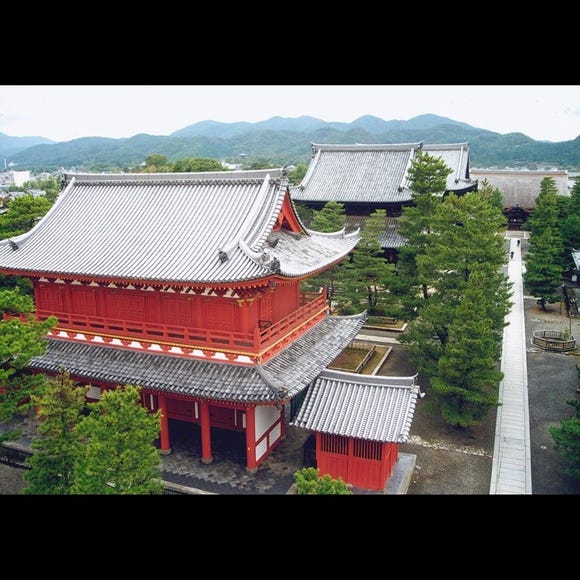
Myoshin-ji Temple
Temples
Arashiyama, Uzumasa
-
Ad

Iseshi Station: Gateway to Japan’s Sacred Heart and the Evolving Ise-Shima Region
-

Smart Buyer's Guide to Luxury Brand Resale in Osaka (Shinsaibashi & Namba)
-
Ad

4 Recommended Restaurants Open After 9 PM Near JR Nara and Kintetsu Nara Station
by: Shingo Teraoka
-
Ad

From March 2026, Kyoto’s accommodation tax rate will change. What exactly is this tax used for?
-
Ad

Kumano Kodo's Nakahechi Route: A World Heritage Journey Starting from Kii-Tanabe Station
-

A First Look at NEMU RESORT’s 2026 Grand Renewal in Ise-Shima: A Resort Shaped by Village, Sea, and Forest
by: Guest Contributor
-

Umeda Loft: Japanese Summer Clothing & Clever Products to Beat the Heat!
-

Limited Time, Max Retail Therapy! Flight Attendant's Tips for the Perfect Osaka Shopping Trip
-

2023 Department Store Fukubukuro in Western Japan: Take a Ride on a New Sightseeing Train!
by: Miyu Shimada
-

Hoshinoya Kyoto: This Incredible Japanese Hotel Welcomes You By Boat on a Sakura-Filled River
-

5 Amazing Kyoto Festivals You’ll Want to Experience During Your Next Trip
-

Japan's Bath Culture: Tips You Should Know!
- #best gourmet Osaka
- #things to do Osaka
- #what to do in kyoto
- #what to bring to japan
- #best gourmet Kyoto
- #new years in Osaka
- #what to buy in nanba
- #Visiting Osaka
- #onsen tattoo friendly arima
- #daiso
- #Visiting Kyoto
- #best japanese soft drinks
- #japanese fashion culture
- #japanese convenience store snacks
- #japanese nail trends







































